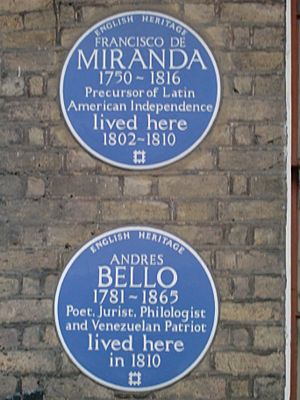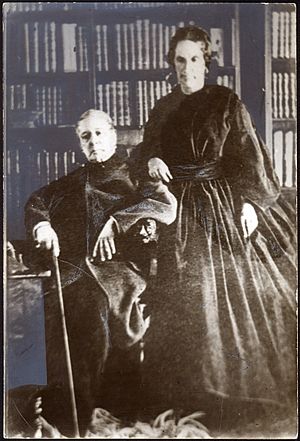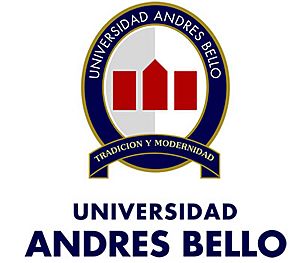Andrés Bello facts for kids
Quick facts for kids
Andrés Bello
|
|
|---|---|
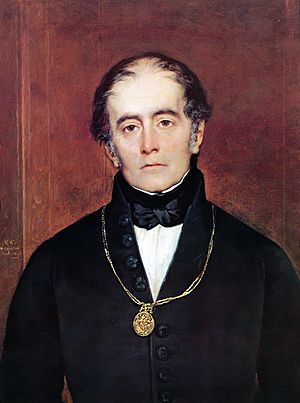
Portrait by Raymond Monvoisin
|
|
| Born |
Andrés de Jesús María y José Bello López
November 29, 1781 Caracas, Captaincy General of Venezuela, Spanish Empire
|
| Died | October 15, 1865 (aged 83) |
| Nationality | Venezuelan, Chilean (from 1832) |
| Signature | |
 |
|
Andrés Bello (born November 29, 1781 – died October 15, 1865) was a very important person in Spanish American culture. He was a Venezuelan and later Chilean writer, diplomat, and teacher. He was also a philosopher and an expert in languages.
Andrés Bello was born in Caracas, Venezuela. For a short time, he was the teacher of Simón Bolívar, a famous leader. Bello helped Venezuela become independent from Spain. He then went to London as a diplomat for the new government. He lived there from 1810 to 1829.
In 1829, Bello moved to Chile with his family. The Chilean government hired him, and he did great work in law and education. In Santiago, he became a senator and a professor. He also managed several local newspapers.
As a lawmaker, he was the main person who wrote the Chilean Civil Code. This was a very new and important set of laws for its time. In 1842, he helped create the University of Chile. He became its first leader and stayed in that job for over 20 years. Because of his many contributions, he became a Chilean citizen in 1832.
Contents
Who was Andrés Bello?
Andrés Bello's Early Life in Venezuela (1781-1810)
Andrés Bello was born in Caracas, Venezuela. He was the first son of Bartolomé Bello and Ana Antonia López. He studied Latin at the Convent of las Mercedes. When his teacher died, Bello translated a part of a famous old poem called the Aeneid.
He studied different subjects at the University of Caracas. He earned a degree in Arts in 1800. He also taught himself English and French. He gave private lessons, and one of his students was the young Simón Bolívar.
Bello became a well-known person in Caracas. He worked for the government and gained fame as a poet. He translated a play by Voltaire. He also edited a newspaper called Gazeta de Caracas. His work with Alexander von Humboldt and Simón Bolívar helped shape his ideas.
During these years, Bello wrote two important books. One was a guide for visitors to Venezuela. The other was a summary of Venezuela's history. These works helped him start his career as a poet. He developed his ideas about humanism and became known as a leading thinker.
On April 19, 1810, Bello took part in events that led to Venezuela's independence. He was named the First Officer of the Ministry of Foreign Affairs. On June 10, he sailed to London on a diplomatic mission. He went with Simón Bolívar and Luis López Méndez. Their goal was to get Britain to support Venezuela's independence. Bello was chosen because he knew English very well.
Andrés Bello's Time in Britain (1810-1829)
Andrés Bello arrived in London in July 1810. He was there to help get money for the revolution. Life in England was hard for him financially. To earn money, he taught Spanish and tutored children.
While in London, he met Francisco de Miranda, another important figure. Bello often visited Miranda's library and the British Museum. He also met other thinkers and writers. He stayed in London for 19 years. During this time, he worked as a secretary for the Chilean and Colombian diplomatic offices. In his free time, he studied, taught, and wrote for newspapers.
A special blue plaque in London marks the building where Bello lived. It reminds people of his time there.
In 1812, Bello faced money problems. An earthquake in Venezuela stopped his family from sending him help. The new Venezuelan government also lost power, which cut off his financial support.
In 1814, Andrés Bello married Mary Ann Boyland. They had three children. His money problems often affected his family. He had to keep finding new jobs. In 1821, his wife died from tuberculosis. Soon after, his son Juan Pablo also died.
In 1823, Bello published a magazine called Biblioteca América. It was very popular in Europe. He also worked on a new way to spell Spanish words. This spelling reform became official in some Spanish American countries, especially Chile.
In 1826, he published another journal called Repertorio Americano. He often wrote for it as an editor and poet. His two most famous long poems, called Las Silvas Americanas, were published around this time. They described the new culture of the Americas. The second poem, La agricultura de la zona tórrida, is very famous. It describes the tropical lands of South America in a style like the ancient Roman poet Virgil.
Bello's situation improved in 1822. He became an interim secretary for the Chilean minister in London. In 1824, Bello married Isabel Antonia Dunn. They had 12 children together. He later became an interim secretary for Colombia, but his pay was often late.
In 1826, Bello wrote to Simón Bolívar asking for financial help. He also felt that their friendship had weakened. In 1828, the government of Chile offered Bello a job. On February 14, 1829, he finally left the United Kingdom.
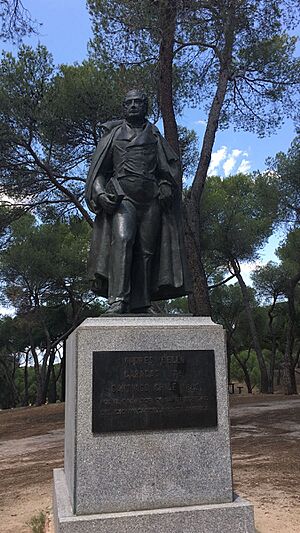
Andrés Bello's Life in Chile (1829-1865)
In 1829, Andrés Bello accepted a job in the Chilean Ministry of Foreign Affairs in Santiago, Chile. He was later named a Senator for Santiago. As a Senator, Bello helped create the University of Chile in 1843. He was the leader of the university for the rest of his life.
Until he died at age 83, Bello worked hard to educate young people in Chile. Many bright thinkers and writers were influenced by him.
One of his most important works was the Grammar of the Castilian Language Intended for the Use by Americans. He finished it in 1847. This was the first Spanish-American grammar book with many new ideas. It has been republished many times and is still a valuable reference. In 1861, Bello became a member of the Royal Spanish Academy.
What were Andrés Bello's main works?
Prose Works
- Complete works from Santiago, Chile:
- I. Philosophy of the Understanding.
- II. Poem of the Cid
- III. Poetry
- IV. Grammar of the Castilian Language
- V. Grammatical Tracts
- VI. Literary and Critical Booklets
- VII. Literary and Critical Booklets
- VIII. Literary and Critical Booklets
- IX. Legal Brochures
- X. International Law
- XI. Project of Civil Code
- XII. Draft Civil Code
- XIII. Unpublished Project of Civil Code
- XIV. Scientific Booklets
- XV. Miscellaneous
- Complete works from Caracas, Venezuela:
- I. Poetry
- II. Drafts of Poetry
- III. Philosophy of Understanding and Other Philosophical Writings
- IV. Grammar of the Castilian Language Destined to the Use of the Americans
- XVIII. Legal and Social Issues
- XIX. Texts and Government Messages
- XX. Labor in the Senate of Chile (Speeches and Writings)
- XXIII. Topics of History and Geography
- XXIV. Cosmography and Other Writings of Scientific Divulgation
- XXV. Epistolario
- XXVI. Epistolario
Poems
- El romance a un samán (Caracas)
- A un Artista (Caracas)
- Oda al Anauco (1800)
- Oda a la vacuna (1804)
- Tirsis habitador del Tajo umbra (1805)
- Los sonnets a la victoria de Bailén (1808)
- A la nave (imitation de Horacio) (1808)
- Alocución a la Poesía, Londres (1823)
- El incendio de la Compañía (canto elegíaco), Santiago de Chile, Imprenta del Estado (1841)
- La agricultura de la zona tórrida (in Las Cien Mejores Poesías de la Lengua Castellana)
What were Andrés Bello's biggest accomplishments?
One of Bello's most famous achievements was writing the Civil Code of Chile. He worked on this set of laws for 20 years. The Chilean Congress passed it in 1855. It was similar to Europe's Napoleonic Code and was later used by Colombia and Ecuador.
How is Andrés Bello remembered?
- Bello is honored by the María Lionza cult in Venezuela.
- In 1953, the Andrés Bello Catholic University was founded and named after him.
- Chile's Andrés Bello Diplomatic Academy is also named in his honor.
- A statue of Bello was put up at St Antony's College, Oxford. It says he was a 'Poet, Jurist, Philosopher, Philologist, Educator'.
- Bello's picture is on old 2,000 Venezuelan bolívar and 20,000 Chilean peso notes. Venezuela also has an award called the Order of Andrés Bello.
- In 1988, Andrés Bello National University, a private university in Chile, adopted his name.
- In 2001, the Andrés Bello Chair was created at New York University. It focuses on Latin American cultures.
- In 2008, the University of Chile started "Public Bello" magazine, named after him.
- In 2014, a column in The Economist about Latin America was named "Bello".
- A building in Mexico City is named Andrés Bello.
Descendants
-
Joaquín Edwards Bello, Chilean writer (1887 - 1968)
-
Clarisa Bello Guzmán, granddaughter
-
Inés Echeverría Bello Chilean writer (1868-1949)
-
Rebeca Matte Bello Chilean sculptor (1875 - 1929)
-
María Emilia Vargas Bello (1896-1978), great-granddaughter
-
Eugenio Cruz Vargas, Chilean painter and poet(1923 -2014)
See also
 In Spanish: Andrés Bello para niños
In Spanish: Andrés Bello para niños


